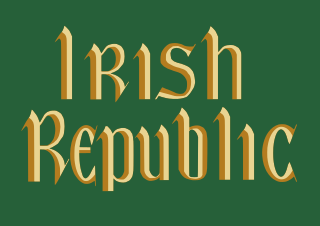
The Free Democratic Party is a liberal political party in Germany.
Mali is located in Africa. The history of the territory of modern Mali may be divided into:

Sinn Féin is an Irish republican and democratic socialist political party in both the Republic of Ireland and Northern Ireland.

The 2000 United States presidential election was the 54th quadrennial presidential election, held on Tuesday, November 7, 2000. Republican Texas Governor George W. Bush, the eldest son of George H. W. Bush, narrowly defeated incumbent Democratic Vice President Al Gore. It was the fourth of five U.S. presidential elections, and the first since 1888, in which the winning candidate lost the popular vote, and is considered one of the closest U.S. presidential elections, with long-standing controversy about the result. Gore conceded the election on December 13.

The 1996 United States presidential election was the 53rd quadrennial presidential election, held on Tuesday, November 5, 1996. Incumbent Democratic President Bill Clinton defeated former Senate Majority Leader Bob Dole, the Republican nominee, and Ross Perot, the Reform Party nominee and 1992 Independent presidential candidate.

The 1968 United States presidential election was the 46th quadrennial presidential election, held on Tuesday, November 5, 1968. The Republican nominee, former vice president Richard Nixon, defeated both the Democratic nominee, incumbent vice president Hubert Humphrey, and the American Independent Party nominee, former Alabama governor George Wallace. This was the last election until 1988 in which the incumbent president was not on the ballot. This was also the last election where a third-party candidate received an electoral vote.

The Bharatiya Janata Party is a political party in India and one of the two major Indian political parties alongside the Indian National Congress. Since 2014, it has been the ruling political party in India under the incumbent Prime Minister Narendra Modi. The BJP is aligned with right-wing politics and has close ideological and organisational links to the Rashtriya Swayamsevak Sangh (RSS) volunteer paramilitary organisation. Its policies adhere to Hindutva, a Hindu nationalist ideology. As of January 2024, it is the country's biggest political party in terms of representation in the Parliament of India as well as state legislatures.

The Indian National Congress (INC), colloquially the Congress Party or simply the Congress, is a political party in India with deep roots in most regions of India. Founded on 28 December 1885, it was the first modern nationalist movement to emerge in the British Empire in Asia and Africa. From the late 19th century, and especially after 1920, under the leadership of Mahatma Gandhi, the Congress became the principal leader of the Indian independence movement. The Congress led India to independence from the United Kingdom, and significantly influenced other anti-colonial nationalist movements in the British Empire.

The Republican People's Party is a Kemalist and social democratic political party in Turkey. It is the oldest political party in Turkey, founded by Mustafa Kemal Atatürk, the first president and founder of the modern Turkish Republic. The party is also cited as the founding party of modern Turkey. Its logo consists of the Six Arrows, which represent the foundational principles of Kemalism: republicanism, reformism, laicism (Laïcité/Secularism), populism, nationalism, and statism. It is currently the second largest party in Grand National Assembly with 125 MPs, behind the ruling conservative Justice and Development Party.
The Democratic Union of the Malian People was a military-backed political party in Mali. Its main organ was the daily newspaper L'Essor – La Voix du Peuple, which had a circulation of 40,000. It was the largest newspaper in the country during the mid-1980s.
The Labour Party is a political party in the United Kingdom that has been described as an alliance of social democrats, democratic socialists, and trade unionists. The Labour Party sits on the centre-left of the political spectrum. In all general elections since 1922, Labour has been either the governing party or the Official Opposition. There have been six Labour prime ministers and thirteen Labour ministries. Since the 2010 general election, it has been the second-largest UK political party by the number of votes cast, behind the Conservative Party and ahead of the Liberal Democrats. The party holds the annual Labour Party Conference.

General elections were held in Mali on 19 June 1979. They followed a 1974 referendum that approved a new constitution allowing for the direct election of the President for the first time. The country was a one-party state at the time, with the Democratic Union of the Malian People (UDPM) as the sole legal party. Its leader, Moussa Traoré, who had overthrown Modibo Keïta in 1968, was the only presidential candidate, and was elected unopposed. In the National Assembly elections several UDPM candidates were able to contest each seat, with 44% of the incumbent MPs defeated. Voter turnout was reported to be 97%.

General elections were held in Mali on 9 June 1985. The country was a one-party state at the time, with the Democratic Union of the Malian People (UDPM) as the sole legal party. Its leader, Moussa Traoré, was the only candidate in the presidential election, and was elected unopposed. In the National Assembly elections several UDPM candidates were able to contest each seat.

Parliamentary elections were held in Mali on 26 June 1988. The country was a one-party state at the time, with the Democratic Union of the Malian People (UDPM) as the sole legal party. As a result, the UDPM won all 82 seats in the National Assembly. Voter turnout was reported to be 97.8%.
The National Youth Union of Mali was a youth organization in Mali. UNJM was the youth wing of the ruling UDPM. UNJM held its first national council meeting in 1979. Mahamadou Baba Diallo served as the general secretary of UNJM.









